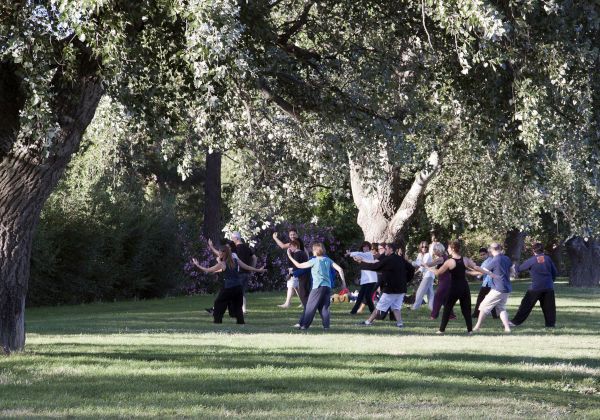Health Benefits of Tai Chi and Qigong
Physical activity is one of the most beneficial things you can do for your health. It reduces the risk of many diseases, including breast cancer. It can also lead to better outcomes for people who have breast cancer and reduce the risk of reoccurrence for those who have recovered from the disease.
Did you know that you don’t have to drip sweat to see the benefits of exercise? For example, tai chi is a gentle exercise that shows similar benefits to more vigorous activities. It may improve the immune system, cardio-vascular fitness, strength, flexibility, balance, stress level and sleep.
That’s why this September 22nd, we’re offering a tai chi option at our 16th Annual Dipsea Hike in Old Mill Park, Mill Valley. It’s a good fit for people who either cannot or would rather not tackle the famous yet strenuous Dipsea steps. The workshop will be led by Tai Chi Foundation of Marin County’s Julie Reinganum, who is generously donating her time and expertise. She will teach qigong techniques for beginners so that participants will learn health-supporting movements they can continue using long after the class. (If you are a breast cancer survivor and are currently feeling financially strapped, please
Here is some more information for those unfamiliar with tai chi and qigong:
What are tai chi and qigong?
Tai chi is an ancient Chinese exercise that seeks to harmonize the mind and body. Commonly described as “meditation in motion,” practicing tai chi involves going through a series of movements slowly and consciously. Reinganum explains, “Tai Chi has aspects of the physical, spiritual, emotional, and intellectual. Qigong is taken from the Tai Chi form. In both, we focus on finding our center of balance and circulating our vital energy. We use the physical form to practice balance, the spiritual awareness to connect ourselves to the world, the emotional feelings to quiet our fears, and the intellectual understanding to learn to relax.”
What has research on tai chi or qigong and breast cancer shown?
Researchers are studying the impact of tai chi on breast cancer in particular. While this is an emerging area of study, initial results are promising. For example, here are the findings of four randomized control trial studies:
- Chen and colleagues found that qigong increased the wellbeing of women undergoing radiation for breast cancer. Those who did qigong showed less depression and fatigue.
- Mustian and colleagues studied the difference between tai chi chuan and psychosocial support groups for women diagnosed with breast cancer. They found that women in the tai chi group showed improved health-related quality of life and self-esteem, while women in the psychosocial support group showed a decline in these areas.
- Larkey and colleagues found that qigong/tai chi led to decreases in survivors’ fatigue, depression and sleep dysfunction.
- Irwin and colleagues studied the impact of tai chi and cognitive behavioral therapy on cellular inflammation for breast cancer survivors with insomnia. They found that tai chi reduced cellular inflammatory responses, demonstrating a likely pathway for the benefits seen in other studies.
How can I learn tai chi or qigong?
Register for the tai chi/qigong workshop at our Dipsea Hike event.
Enroll in Julie Reinangum’s Monday night classes in Mill Valley. Fall classes start September 24th.
Find a tai chi class near you.
Sources
Breastcancer.org. 2013. “Tai Chi”. Retrieved July 17, 2018.
Chen, Zhen, Zhiqiang Meng, Kathrin Milbury, Wenying Bei, Ying Zhang, Bob Thorton, Zhongxing Liao, Qi Wei, Jiayi Chen, Xiaoma Guo, Luming Liu, Jennifer McQuade, Clemens Kirschbaum, and Lorenzo Cohn. 2013. “Qigong Improves Quality of Life in Women Undergoing Radiotherapy for Breast Cancer: Results of a Randomized Control Trial.” Cancer. 119(9):16.
Irwin, Michael, Richard Olmstead, Elizabeth C. Breen, Tuff Witarama, Carmen Carillo, Nina Sadeghi, Jesusa M. G. Arevalo, Jeffery Ma, Perry Niassio, Patricia A. Ganz, Julienne E. Bower, and Steve Cole. 2014. “Tai Chi, Cellular Inflammation, and Transcriptome Dynamics in Breast Cancer Survivors with Insomnia: A Randomized Controlled Trial.” JNCI Monographs. 2014(50):295-301.
Larkey, Linda K., Denise J. Roe, Karen L. Weihs, Roger Jahnke, Ana Maria Lopez, Carol E. Rogers, Byeongsang Oh, and Jose Guillen-Rodriguez. “Randomized Control Trial of Qigong/Tai Chi Easy on Cancer-Related Fatigue in Breast Cancer Survivors.” Annals of Behavioral Medicine. 49(2):165-76.
Mayo Clinic. 2015. “Tai Chi: A Gentle Way to Fight Stress”. Retrieved July 17, 2018.
Mustian, Karen M., Jeffrey A. Katula, Diane L. Gill, Joseph A. Roscoe, David Lang, Karen Murphy. 2004. “Tai Chi Chuan, Health-Related Quality of Life and Self-Esteem A Randomized Trial with Breast Cancer Survivors.” Supportive Care in Cancer. 12(12):871-876.
Written by Lianna Hartmour, ZBC Education Coordinator
